Advertisement
A Deep Dive Into The 22 Major Arcana Cards + What They Mean In A Tarot Reading

Every card in a traditional tarot deck has a specific meaning. The cards are split into two categories: the Major Arcana and the Minor Arcana. Whether you're newly dipping your toes into tarot or you're a seasoned reader, here's a look at what each of the 22 Major Arcana cards in your tarot deck means and how to interpret them, according to tarot experts.
What are the Major Arcana cards?
Before we dive into each card, let's first look at what the Major Arcana cards as a whole are all about. These cards are also known as Trump cards, beginning with "The Fool" at zero, and ending with "The World" at 21.
The Major Arcana cards depict the Fool's Journey as he learns lessons along his path—and when pulled during a tarot reading, they represent an overarching theme and nudge us to think about the bigger picture, astrologist and tarotist Bess Matassa previously explained to mbg.
The Major Arcana cards are also often complex and significant, and their appearance will influence the entire reading. If you pull one or more in a multi-card pull, you'll want to pay close attention.
Without further ado, here's what each of the 22 Major Arcana cards means:
The Fool, 0:
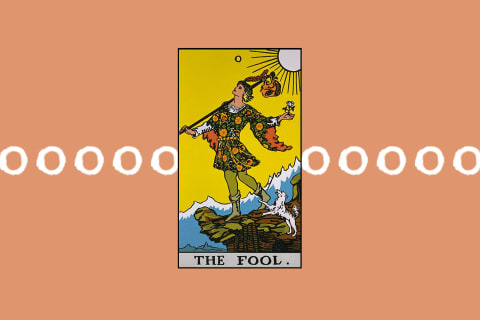
- Beginning of a journey
- Childlike wonder
- Risk
- Potential
- Naivety
Being the first card in the deck, the Fool is all about embracing new beginnings, expanding your horizons, and taking a chance based on your intuition, tarot reader and founder of Witchy Wellness Leah Vanderveldt previously told mbg.
"It's about having an intuitive ping to do something—to take a leap—and trusting that you'll be able to catch yourself." By extension, this card also has an element of naiveté and speaks to the excitement of the unknown.
The Magician, I:
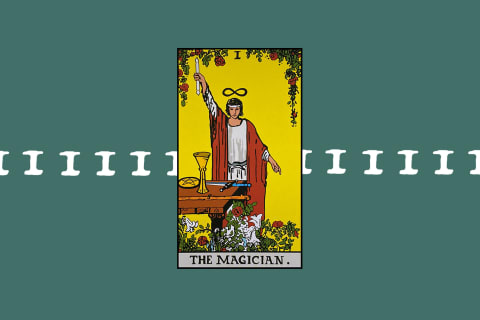
- Manifesting
- Healing
- Spirituality
- Connection to the divine
According to author of The Modern Witchcraft Book of Tarot Skye Alexander, the Magician card represents the ability to understand and command the unseen forces that operate in the universe.
"When the Magician shows up in a reading, he indicates you have special powers, but you may not realize them yet or you may not be using your powers," she says noting that he reminds you that you're "constantly creating your reality and that your thoughts are the forerunners of manifestation."
The High Priestess, II:
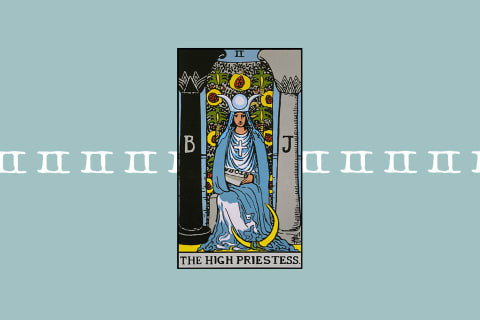
- Divine feminine
- Human wisdom
- Studying nature
- Spiritual mystery
- One's inner world
The High Priestess tarot card, according to Alexander, is an enigmatic card symbolizing feminine spiritual power, or the Goddess from whom all life comes and to whom it all returns.
"She's sometimes positioned between two pillars—one black, one white—which represent the dual nature of existence: good and evil, light and dark, truth and deception, positive and negative," she adds.
The Empress, III:
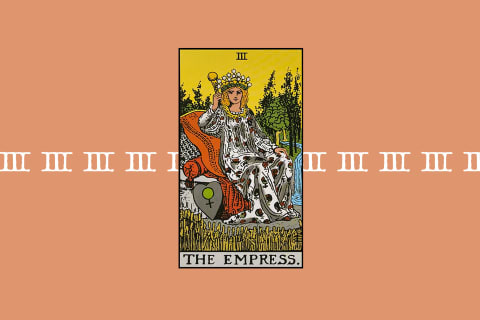
- Nature
- The Great Mother
- Fertility
- A channel for the High Priestess on Earth
According to tarot expert and creator of The Wild Unknown Tarot Kim Krans, the Empress contains a mysterious power and magnetism—a vitality or life force relating to the divine feminine found throughout nature.
"The big question for the Empress," Krans says, "is how will the power be used? Will the Empress rule from above, looking down at those less fortunate? Or will the Empress slow down, trust, and settle into the earth, finding new ways to govern by spreading kindness and generosity throughout the realm?"
The Emperor, IV:
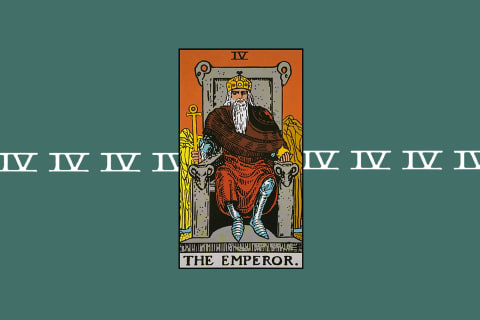
- Leadership
- Influence
- Stability
- Potential for mastery
Just as the Empress is an archetypal mother figure, the Emperor is the paternal equivalent and symbolizes leadership, strength, and power in the natural world.
As Alexander explains, he's a figure of supreme authority, and one to be reckoned with at that. "He's the savvy executive, the brave warrior, the responsible civic leader who has reached the summit of authority and achieved worldly power," she notes.
The Hierophant, V:
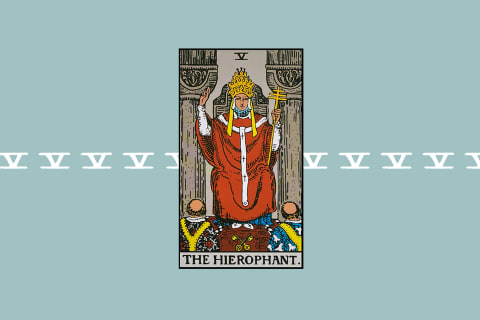
- Practical lessons related to natural law
- Study
- Mastering one's chosen area of expertise in this life
Sometimes referred to as "the Pope" in particular decks, the Hierophant almost always relates to traditional structures of some kind, according to Alexander. "The Hierophant is a figure of authority and power, like the Emperor, but the Hierophant's power is of a spiritual nature," she explains.
Sometimes, he can also indicate you may seek to break away from traditional limitations to follow your own spiritual path, she says, adding that this card can signify an actual person, and namely "someone who is a leader of a spiritual group—and that leader may be you, whether or not you realize it yet."
The Lovers, VI:
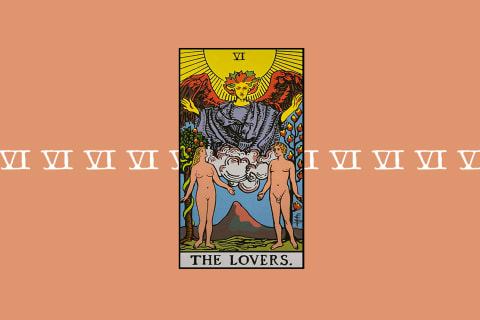
- Difficult decisions in relationships
- Changes to come in relationships
- Compromise
- Growth in a relationship
According to Vanderveldt, the Lovers is a card about connection and the possibilities of deep intimacy. "When this card shows up, we are usually giving our power away to something outside of ourselves. Sometimes it's a relationship; other times it's a title, job, or something material," she adds.
You may feel like external circumstances and relationships give you value when this card appears. "If you took that particular person away, you are still a loved and loving individual. If you took the job away, you are still capable and good at what you do," Vanderveldt notes, adding, "It's a process of choosing yourself first before engaging in a healthy relationship with anything outside yourself [...] We're being asked to fully accept ourselves as worthy."
The Chariot, VII:
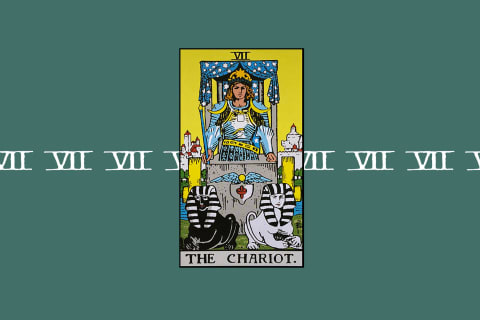
- Controlling opposing forces
- Willpower
- Resolving conflict
- Travel
The Chariot is a card of opposing forces, as well as how to overcome and/or control them, Alexander notes. "In some decks, he holds no reins—he uses sheer willpower to keep his steeds moving together in a forward direction," she adds.
When you pull this card, it represents "mastery of opposing forces and control over inner conflicts," and on a literal level, it can also indicate travel and transportation, Alexander says.
Strength, VIII:
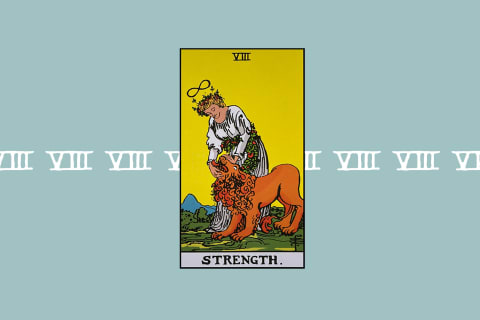
- Ego versus intuition
- A need for discipline
- Refinement of self-interest to achieve harmony with the inner self
The Strength tarot card depicts a woman controlling a powerful lion and even treating him affectionately. As Alexander explains, this represents inner power, overcoming weaknesses, courage, and persistence.
"Although some interpretations view this card as emblematic of the struggle with your 'animal' nature, others see it as symbolic of self-confidence and inner strength, and of being in harmony with your instinctive nature," she adds.
The Hermit, IX:
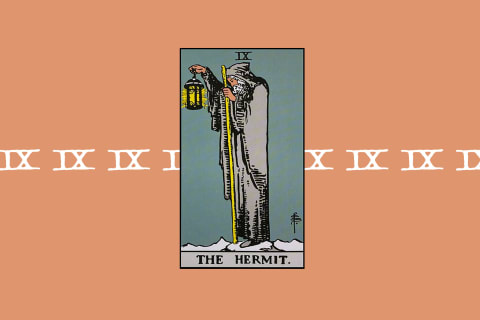
- Introspection
- Contemplation
- Inner reflection
- The benefit of time spent alone
As its name suggests, the Hermit is about going within, solitude, and reflection. Alexander notes it also relates to inner wisdom, guidance, and self-evaluation and is often a call to introspect.
"A seeker of truth, he lights the way ahead for those who follow," she explains, adding that when the Hermit appears in a reading, it can mean a guide figure is at hand, offering help. "But usually it refers to inner guidance or getting in touch with a spirit guide, [...] withdrawing from the busyness and distractions of the outer world, [and doing] some soul-searching," she notes.
Wheel of Fortune, X:
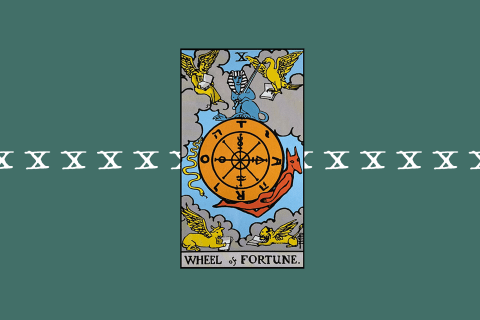
- Imminent and often positive change
- The inevitable seasons and cycles of life
- Beginnings and endings
The Wheel of Fortune is all about change and cycles. It symbolizes the inevitability of change, beginnings, and, of course, endings. As Vanderveldt previously explained to mbg, it's also related to "what happens at the crossroads of fate and choice, where we break old patterns through choice."
This card calls on the subject to be adaptable as they navigate these changes, Vanderveldt says, and stay centered. "When this card comes up, it's a good time to ask yourself: How do you want to respond (to the good, bad, and everything in between)?" she says.
Justice, XI:
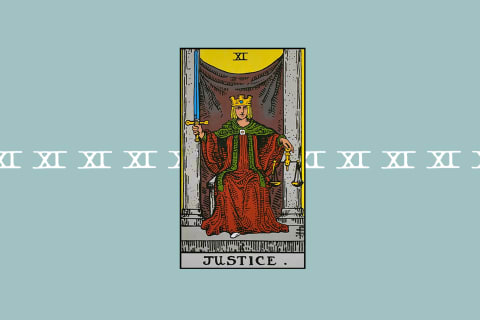
- Fairness
- Moral sensitivity
- Karma
- Attention to detail
According to Vanderveldt, the Justice card represents truth, balance, and objectivity, as well as accountability, fairness, sacred truth, inner knowing, and of course, justice.
"It can often come up when you're being asked to have radical honesty with yourself to make a choice," she notes, adding, "Balance comes from making the choice that's right, even if it's difficult. There's a call for harmony and balance, but to find the correct equilibrium for the situation, you must first get totally honest about the situation or decision."
The Hanged Man, XII:
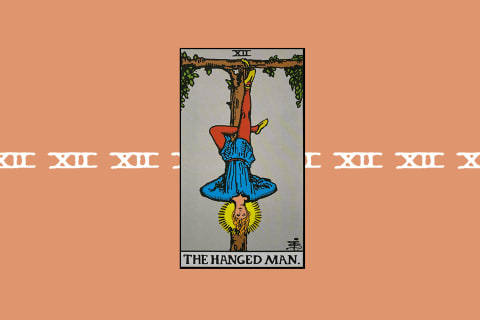
- Consequence
- Surrender
- Stagnation
- A situation that must be waited out
Appearing right before the Death card in the Major Arcana, the Hanged Man represents letting go, surrendering, sacrifice, and seeing things from a different perspective, according to Alexander.
"When this card appears in a reading," she notes, "it can mean surrendering to a situation, or letting go of old patterns or attitudes," adding, "You're ready to make sacrifices in order to be true to yourself."
Death, XIII:
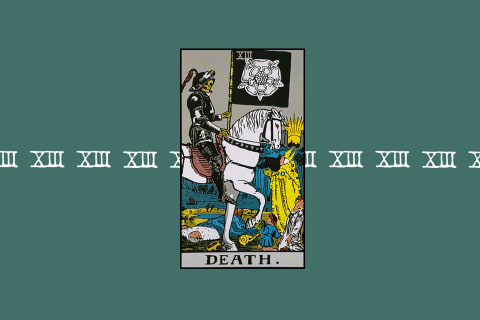
- Endings
- Harvesting
- Freeing oneself
- Moving forward
While it may look ominous, this card isn't a prophecy of death. It is, however, a sign of endings, according to Vanderveldt. She previously told mbg that it's a card of change and transformation, noting that, "It's a big piece in the process of personal evolution in which we release old patterns."
The Death card represents the shedding required to continue progressing along one's path, and the cards on either side (the Hanged Man and Temperance) are also part of the "death journey," in which we prepare for an ending by surrendering and releasing fears of judgment (the Hanged Man) and then go through a rebirth by transmuting our past pain (Temperance).
Temperance, XIV:
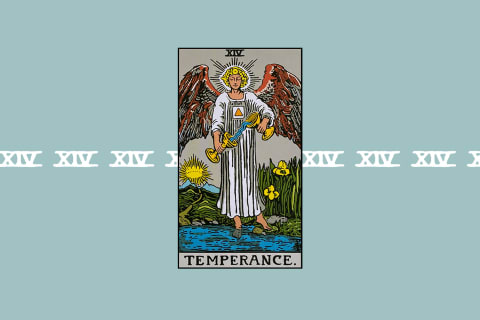
- Moderation
- Balance
- Self-evolution
- Avoiding extremes
The Temperance card represents moderation, balance, self-evolution, and avoiding extremes. As author and tarot expert Claire Goodchild previously explained to mbg, this card appears in our lives when we're feeling out of balance—and sometimes even when we don't feel out of balance but actually are.
It can also indicate that we've been too indulgent and need to take a step back, she says. The word temperance, after all, literally means "moderation in action, thought, or feeling," as well as abstinence from drinking alcohol. "The Temperance card's main theme is about restoring balance, and another big part of it is mind over matter," Goodchild notes, adding, "Anything you want to do, you can do. It just takes a little bit of work and finessing what's happening."
The Devil, XV:
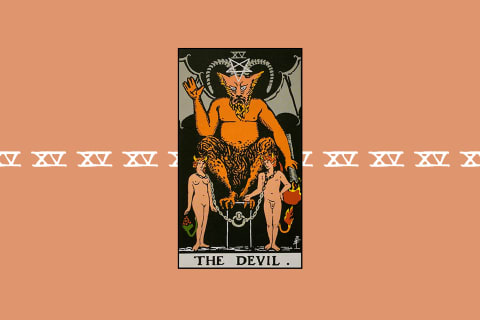
- The shadow self
- Material and worldly pleasure
- Unhealthy relationships
- Entrapment
According to Vanderveldt, the Devil card is like a stand-in for our inner demons. "The things we give our power away to, the voices that keep us small or ashamed—essentially our shadowy parts," she previously explained, adding this card often shows up around unhealthy patterns in our lives, be it in relationships, negative or harmful self-talk, and/or issues of addiction.
"The good news is when the Devil comes around, you're given the opportunity to dance with this energy and liberate yourself from any cycles or dependencies that are keeping you down and afraid," she says. This card can also be an invitation to dive into some shadow work.
The Tower, XVI:
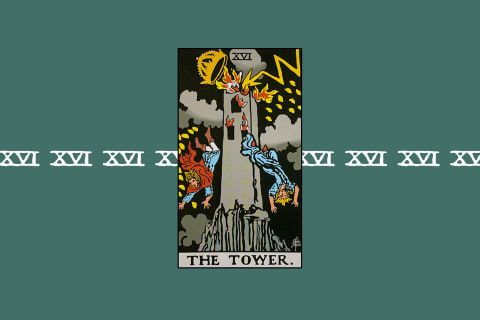
- Imminent or present danger
- Upheaval
- Unexpected change
The Tower is one of the more ominous cards in the Major Arcana, as it typically heralds major change, disruption, and even danger. Tarot reader Theresa Reed previously told mbg it symbolizes disruption, chaos, the collapse of a faulty structure, as well as something coming to a dramatic end.
And as tarot reader Mark Horn adds, "There's an element of surprise to the Tower—it's a change you weren't expecting, usually because your idea about what is going on is either a fantasy or you don't have all the information you need." When you pull this card, just remember it represents a necessary ending, Reed notes.
The Star, XVII:
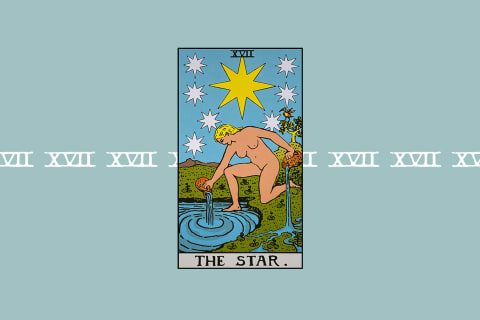
- Spirituality
- Purpose
- Connecting to the divine
- Transcendence
- Inspiration
According to Brigit Esselmont, founder and CEO of Biddy Tarot, the woman depicted in the Star card is both practical and intuitive, and her nudity represents both her purity and vulnerability. The single large star shown also symbolizes her core essences, while the seven smaller stars represent the seven main chakras.
"It's a beautiful card with a deep and powerful message, especially for those going through a rebirth of some kind," Esselmont previously told mbg, adding that it invites the reader "to shed her skin—all the layers that have built up over the years—and be 'naked' under the beauty of the starry night sky"—aka being vulnerable, authentic, and raw.
The Moon, XVIII:
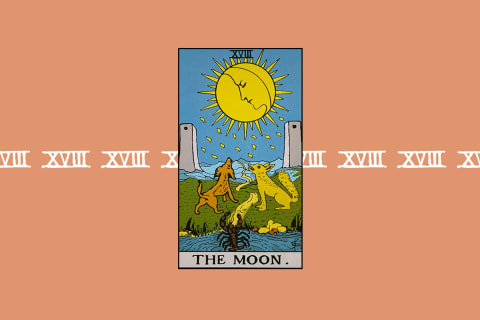
- Illusion
- Impressionability
- Deception
- Confusion
- Strife
The Moon card appears when the subconscious is reflected back to us and we get the chance to work with it, Vanderveldt previously told mbg. "There's an element of diving deep into the depths of who you are and being willing to see and accept everything you find."
She adds that when you pull this card, it's an invitation to "release the control you've held over your internal, emotional realm in order to access your innermost truths." Relating to this card requires connecting deeply to—and accepting—all that you are, she explains, noting that, "There's an urging to turn to your intuition and dreams during this time to assist you," when the Moon appears.
The Sun, XIX:
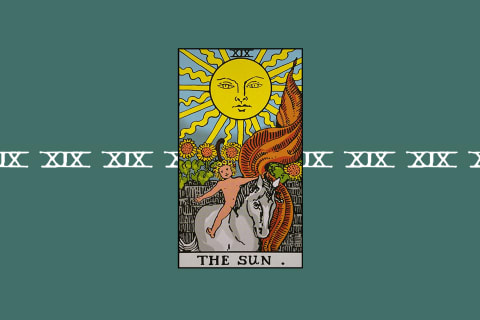
- Vitality
- Joy
- Good fortune
- Confidence
- Authenticity
Arguably one of the most positive cards you can pull in a tarot reading, the Sun is all about happiness, success, pleasure, self-expression, and vitality. According to Alexander, the Sun card also represents life itself, "for the sun gives life to everything on Earth."
She notes that it's one of the most joyful cards in the tarot, heralding success, good fortune, confidence, and all the other positive associations we hold with the sun as a life-giving force.
Judgement, XX:
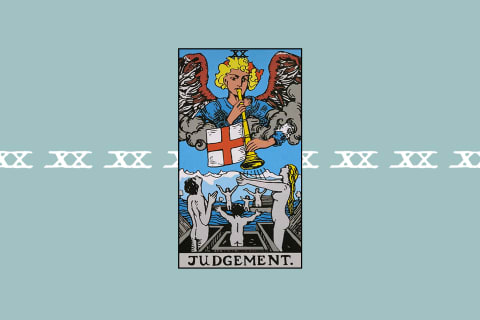
- Resurrection
- Awakening
- Freedom from inner conflict
- Decisions to be made
A card of awakening, self-realization, choices, and rebirth, Alexander says the Judgement has overtones of Christianity's "Day of Judgement," when God judges all souls—and either rewards or punishes them.
"In a broader sense, however, Judgement represents a time of awakening and self-realization," she explains, "when you must make adjustments to reflect who you truly are."
The World, XXI:
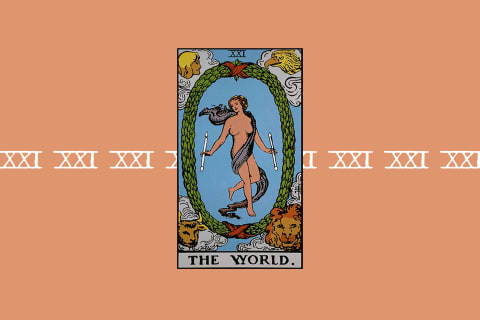
- Ending of a cycle
- Major change
- Self-actualization
The final card of the Major Arcana, and subsequently, the Fool's Journey, the World card is a big up-level. As Vanderveldt previously explained to mbg, it's a card of "absorbing the lessons and wisdom that bring a person into a new understanding of their life and their role in it."
"It's an encapsulation of the dance of life—sometimes mysterious but ever moving and cycling," she says, adding this card also relates to hard-won lessons, growth, and the satisfaction that comes with it. "It may not have been easy or pretty getting through it, but on the other side, you're at a new stage of life—wiser and ready for a new phase."
The takeaway.
Each of the Major Arcana cards has a nuanced meaning that relates to common themes in our lives, as well as the different stages of the Fool's Journey. Whether you pull the Fool, the World, or any of the cards in between, it's not so much the card itself that's important but rather what you choose to do with its lesson on your own spiritual journey.